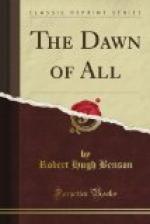The monk turned again.
“Can you understand Russian?”
Monsignor shook his head.
“Well, I’ll tell you afterwards,” said the other.
* * * * *
It seemed very strange to be sitting here, in this quiet room, after the rush and push of the enormous crowds through which they had made their way this morning. The air of the room was exceedingly business-like, and not in the least even suggestive of religion, except in the matter of a single statue of Our Lady of Lourdes on a bracket on the wall above the President’s head. And these dozen men who sat here seemed quietly business-like too. They sat here, men of various ages and nationalities, all in the thin white doctor’s dress, with papers spread before them, and a few strange instruments scattered here and there, leaning forward or leaning back, but all intently listening to and watching the Russian, who, still with closed eyes, answered the short questions put to him continuously by the President. There seemed no religious excitement even in the air; the atmosphere was one, rather, of simple science.
There seemed something faintly familiar in all this to the man who had lost his memory. . . . Certainly he had known of Lourdes as soon as it was mentioned to him, and he seemed now to remember that some such claim to be perfectly scientific had always been made by the authorities of the place. But he had supposed, somehow, that the claim was a false one. . . .
The Russian suddenly rose.
“Well!” whispered Monsignor sharply as the doctors began to talk.
The monk smiled.
“He’s just said an interesting thing. The President asked him just now whether he had seen anything of the crowds as he came down this morning.”
“Yes?”
“He said that people looked like trees moving about. . . . Oh no! he didn’t know he was making a quotation. Look! he’s going down to the grotto. He’ll be back in half an hour to report.”
Monsignor leaned back in his chair.
“And you tell me that the optic nerves were destroyed?”
The monk looked at him in wide-eyed wonder.
“Certainly. He was examined on Tuesday,
when he came.
To-day’s Friday.”
“And you believe he’ll be cured?”
“I shall be very much surprised if he’s not.”
There was a stir by the door as the Russian disappeared. A young, bright-eyed doctor looked in and nodded, and the next instant a brancardier appeared, followed by a litter.
“But how have you time to examine all these thousands of cases?” asked the prelate, watching the litter advance.
“Oh, not one in a hundred comes through to us here. Besides, this is only one of a dozen committee-rooms. It’s only the most sensational cases—where there’s real organic injury of a really serious kind—that ever come at all before the highest courts. Cases, I mean, where, if there’s a cure, the publication of the miracle follows as a matter of course. . . . What’s this case, I wonder?” he ended sharply, glancing down at the printed paper before him, and then up again at the litter that was being arranged.




